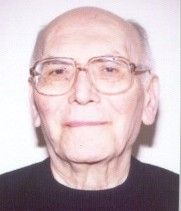Daniel Comboni
Comboni Missionaries
Institutional area
Other links
Newsletter
In Pace Christi
Rebucini Battista
Fr. Battista Rebucini was born in Gerosa, Bergamo, on 14 January 1921. As soon as he finished his primary education, he entered the diocesan seminary where he excelled in his studies, spiritual growth and piety. Ordained priest in 1944 at the age of 23, he was sent to Rome to obtain a degree in moral theology at the Pontifical Lateran University, with a view to teaching at the seminary. He was, at the same time, appointed assistant priest at Brembilla.
Fr. Battista’s vocation was certainly due in part to his saintly mother. In the death-entry register, the parish priest, departing from the usual practice, wrote about her: “A most pious woman.” While still young she had wanted to become a nun, but was prevented from doing so by her totally anticlerical father. Encouraged by her confessor, she agreed to get married, asking two things of God: first, if she had a son, that he would become a priest; second, that her father should return to the practice of the faith. The Lord granted what she asked and even more: two of her sons became missionaries and the conversion of her father was such that it astounded the whole district.
Another fundamental element of his vocation was his devotion to the Madonna della Foppa, a sanctuary near his home, where from childhood he would go with his mother to pray.
In the meantime, Fr. Battista felt the missionary vocation growing within him. He spoke of it to his bishop, who was not very much in favour of the idea, seeing the years of study and how much these had cost. Finally, however, he decided to let him go and wrote to the Comboni superiors: “He is one of my best priests for his sanctity, intelligence and zeal; I beg you, however, never to appoint him superior since he would never be able to bear it on account of him being such a precise character and so exact in everything.” In 1945 he entered the novitiate and on 19 March 1947 took his first vows.
He was immediately sent by his superiors to Venegono Superiore to teach moral theology to the Comboni students. Fr. Battista was a meticulous professor, clear and precise. Being worried in case he might not properly prepare the future priests for the ministry of reconciliation, he strove to apply the general moral principles to particular cases of daily life. As a teacher he was kind, understanding and always ready to assist anyone who found things difficult.
He did not limit his work to teaching: he was available for mission appeals, attended meetings of priests, helping to resolve moral problems and gave conferences. Apart from being an eminent professor, he was a true father. His life was marked by episodes of naivety mixed with craftiness: when the students would take advantage of him for their amusement, he joined in the fun.
In 1952 he had his first experience of Africa. He was sent to Uganda as teacher of moral theology to the seminarians at Gulu. Here he redoubled his efforts since he feared he did not know English well enough, which he self-taught while in Italy in view of his work in the missions.
In 1956, having taught generations of African priests, he was forced to return to Italy due to a viral infection which caused fevers and walking difficulties. In 1965 he tried again to work in Africa and held on for ten years. In his years of teaching, in Italy and Africa, he contributed to the education of more than 1000 priests.
In 1975 he was taken back to Italy on a stretcher, stricken by the same medically unknown virus as in previous years. He was a patient at the Gemelli Hospital in Rome and later in England, but with little or no improvement in his condition.
Since he could no longer serve in the missions, he became a confessor at San Tomio, Verona, where he remained for twelve years, from 1977 to 1989. There he was called “the theologian”. His Mass was always very well attended, thanks to his manner of preaching and his clear explanations. Many people, priests, faithful, Sisters and Brothers went to him for confession whenever he went to visit their convents, which he used to do on his days off.
His condition worsened all the time till his death. He passed the last sixteen years of his life on the second floor of the Mother House, in the Centre for Sick and Elderly Confreres, barely able to drag himself along the corridor, and then in a wheelchair, unable to move. His was a long drawn out Calvary, but he was always happy and optimistic. To those who asked him how he was, he invariably answered that he was well. He never complained.
Fr. Battista died from heart failure on the evening of 9 May 2006 as he was having supper and just a while after celebrating Mass with his confreres. A solemn requiem Mass was celebrated at the Mother House attended by many confreres and people who had known him. The funeral took place at Berbenno, where he was interred in the priests’ tomb, alongside his brother Riccardo.
Da Mccj Bulletin n. 232 suppl. In Memoriam, ottobre 2006, pp. 60-69

